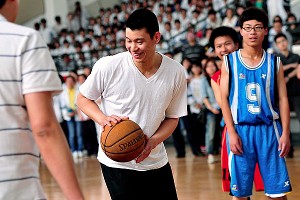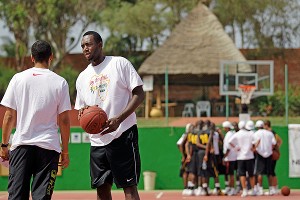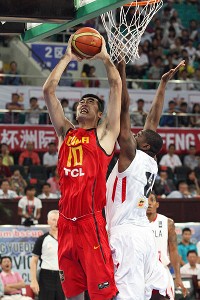Home >Unlabelled > Jeremy Lin and the NBA's expanding horizons - ESPN
Jeremy Lin and the NBA's expanding horizons - ESPN
Posted on Thursday, February 23, 2012 by NBA Playoff Schedule 2012
There probably aren't many times when the NFL looks at the NBA with envy, but this surely has to be one of them. Dominant as it is domestically, professional football has no equivalent to the global phenomenon that is Jeremy Lin right now. While the NFL still tries to convince international audiences to pay attention, the NBA enters its All-Star weekend with not just the hottest story -- Lin -- but with an expanding brand, one that has a foothold once again in China.
Twenty years ago, as basketball braced for the debut of the Dream Team, "international" in NBA terms essentially meant Eastern Europe. Yes, there were players from other places in the world; notably Hakeem Olajuwon, Dikembe Mutombo and Manute Bol, all African. But they'd been trained and Americanized, to a great degree, at U.S. colleges before their NBA careers. The truly exotic players (that's the way it seemed at the time) were mostly from Eastern Europe. The list included Vlade Divac, Toni Kukoc, Arvydas Sabonis, Drazen Petrovic and Sarunas Marciulionis.

Getty ImagesJeremy Lin was big in China even before his rise with the Knicks. In May of last year, he played in a friendly game at a middle school in Pinghu, his family's ancestral home.
With rosters in flux, it's difficult to come up with an accurate count on any one day, but it appears that the NBA currently has 89 foreign-born players from 40 different countries. That's nearly double the number on NBA rosters on opening night in the fall of 2000. That number, of course, doesn't even include Lin, an American-born-and-raised player whose parents emigrated from Taiwan and who is having at the moment a bigger impact on the sport worldwide than LeBron James.
As one longtime NBA executive with experience scouting in China said this week: "Jeremy Lin may be the impetus that takes a country already gaga over basketball and makes it the next basketball power. You reach a critical point when you have interest, which China does … population which equals talent and the financial means. China's expanding economy can support the players, the development of youth programs and new facilities. Remember, more people play basketball in China on a regular basis than there are, total population, in the U.S."
Of course, it isn't just China where interest in professional basketball has exploded. Tony Ronzone, who has worked as a coach, scout and executive for several NBA clubs, talked this week about the "dramatic change" he has seen in the globalization of basketball since the Dream Team took the court at the Barcelona Olympics in the summer of 1992.
"I'll be in, say, Odessa and it's midnight in the Ukraine when I return to my hotel," Ronzone said, "and turn on the TV and there's the Clippers playing the Rockets on NBA TV. The brand has extended to a point people here mostly don't realize. The game now includes practically every nationality and race. There's a pro league everywhere. I coached the Saudi Arabia national team. I was invited to North Korea to bring my videotapes. They invited me as an Italian; nobody wanted to say I was from America. Look, the infrastructure is still challenged in Third World countries. But watching Sabonis years ago, watching Dirk Nowitzki now, has opened their eyes."

AP Photo/Rebecca BlackwellThe Milwaukee Bucks' Luc Mbah a Moute of Cameroon, second left, was among NBA coaches and players mentoring some of Africa's best young players at a 2010 Basketball Without Borders camp.
Ronzone figures he's visited 71 countries scouting basketball players, and has conducted coaching clinics in as many as 55. He has spent a ton of time traveling through China and ticks off professional leagues in the Philippines, Malaysia, Singapore, Thailand and Japan. While traveling with the Mavericks' Donnie Nelson in 1998, Ronzone discovered a young Yao Ming playing 3-on-3 in the streets of Shanghai.
"The thing you have to keep in mind as we watch the Jeremy Lin phenomenon," Ronzone said, "is that we're not just talking about China. They're watching this closely and in huge numbers throughout Asia … in South Korea where there's a great pro league, the KBL. But the impact in China will be phenomenal. Look, Yao Ming is 7-foot-5 and Lin is 6-foot-3. There are 300 million people regularly playing basketball in China alone; 200 million of them are guards. You have the talent and the billionaires to sustain and grow these leagues. I ran across more than 30 7-footers in China, from Mongolia to Beijing. I think in five to 10 years, now that they're just starting to really adopt weight training, we're going to see a real migration of Chinese players."
That's if China doesn't keep its players in its own leagues, which has to worry the NBA on some level.
Another scout with experience traveling through China said: "It might take a couple of decades. But as China develops rivalries, aspirations, youth facilities, developmental leagues and recognition of people like Yao Ming and Jeremy Lin, they'll start harvesting. China, [in] 20 years, will be like Yugoslavia in the 1990s. Yugoslavia embraced it in the 1970s and 1980s and developed Vlade Divac, Kukoc, Petrovic … By the time we got to the '90s, Yugoslavian coaches dominated the Euro leagues and FIBA Europe. If FIBA Asia starts to take on the look of Chinese basketball, look out. Their pro leagues are already starting to compete with other pro leagues around the world. We're on the cusp of an explosion of basketball in China."

STR/AFP/Getty ImagesBasketball has exploded in China. Zhang Zhaoxu, left, played on the national team in a FIBA tournament last August.
All that said, when I asked Ronzone what place in the world impresses him the most right now in terms of sheer talent, especially if he projects long-term, he said: "Africa is coming. Trust me, there are 25 Serge Ibakas and Bismack Biyombos in Africa right now. OK, the infrastructure isn't there yet, and there's no real history of playing the game yet. … But the best players are transitioning from what I call a soccer mentality. They're very athletic and they use their footwork when trying to come up with the answer, 'How do I get by him?' Think of Steve Nash and footwork. In America, our coaches put young players underneath the basket, and if the kid doesn't grow anymore, he still doesn't have the skill set of a smaller player. [Internationally], they teach everyone to play basketball outside first, so that all the kids regardless of size have certain skills."
Suddenly the world is watching a Taiwanese-American excel in Madison Square Garden -- one who, so far, is being warmly embraced and not resented by the biggest stars in the league, the Kobe Bryants and Kevin Durants. It's a story that, from all indications, plays well in Cameroon, in Iran, in Tanzania, as well as in Norman, Okla., or Tuscualoosa, Ala.
There's an increasing shrinking of the world and a world culture that is developing, which basketball is tapping into. The night he checked Lin out, one NBA scout wrote, "May be a really good NBA prospect because he has a definable position for which he has the requisite skill … knows how to make others on the floor better already."
Now, he notes, "Anybody who bursts the stereotype changes the game."
He could have added "further impacts attitudes and the expansion of the game." Lin is the everyman who through perseverance made himself an NBA player, reminding people worldwide that nothing is unattainable. It is an extraordinary story, the personal part of which has been celebrated appropriately. But the global cultural impact the Lin phenomenon has had on the game of basketball won't be fully told or appreciated for quite a few years.
Michael Wilbon is a featured columnist for ESPN.com and ESPNChicago.com. He is the longtime co-host of "Pardon the Interruption" on ESPN and appears on the "NBA Sunday Countdown" pregame show on ABC in addition to ESPN. Over the course of three decades with The Washington Post, Wilbon earned a reputation as one of the nation's most respected sports journalists. You can email him here and follow him on Twitter @RealMikeWilbon.
24 Feb, 2012
-
Source: http://news.google.com/news/url?sa=t&fd=R&usg=AFQjCNHspAvR-HO8FOs_83FPFoXLa6zEIA&url=http://espn.go.com/espn/commentary/story/_/page/wilbon-120223/international-popularity-jeremy-lin-cements-nba-role-global-sport
--
Manage subscription | Powered by rssforward.com
Blog Archive
-
▼
2012
(2069)
-
▼
February
(971)
- Power Rankings, Vol. IV
- Previewing WSU opponents: Loyola
- It's Halftime
- R.I.P. Dunk-Contest...ein Nachruf
- NBA All-Star Weekend Review
- Miami Heat: LeBron James no substance just talent!
- Video: All-Star Weekend
- Gerüchteküche (All-Star Edition)
- Stern pleased despite condensed NBA schedule - Was...
- NBA All-Star Game: Live updates from Amway Center ...
- NBA All-Star Game 2012: Kevin Love Representing Ti...
- 2012 NBA All-Star Game: LeBron James The Odds-On F...
- NBA All-Star Chat: Will Kobe Bryant get his 5th Al...
- 2012 NBA All-Star Game: East Roster Features LeBro...
- Sacramento, Maloofs meeting on Kings - USA TODAY
- Dwight Howard saga dominates NBA's second half - N...
- NBA All-Star Weekend 2012: All-Star Game, Three-Po...
- VIDEO: Kevin Love beats out Kevin Durant to win 3-...
- Daytona 500, Oscars, NBA All-Star Game may bump up...
- 2012 NBA All-Star Game: Knicks' Carmelo Anthony St...
- 2012 NBA All-Star Game Time, TV Schedule And More ...
- NBA commish talks about Seattle, Sacramento - KING...
- NBA All-Star Weekend: Flo Rida Performs A 'Good Fe...
- NBA Analysis: Miami Heat Midseason Review - Opposi...
- Magic Johnson's 1992 NBA All-Star appearance a def...
- NBA Standings 2012: Can The Mavericks Climb The St...
- David Stern: Adam Silver worthy successor as NBA c...
- Great expectations in NBA's second half - ESPN
- Previewing WSU opponents: Youngstown
- The 2012 NBA All-Star game, the L.A. story - Exami...
- Fake NBA All-Star gear leads to arrests in Orlando...
- NBA All-Star Saturday: No. 1 in Orlando ratings - ...
- NBA All-Star Weekend: Slam dunk contest and three-...
- NBA All-Star Game 2012: TV Info, Time, Anthem/Half...
- NBA All Star Basketball - KENS 5 TV
- NBA All-Star Game 2012: 5 All-Stars You Don't Want...
- David Stern says Adam Silver is ready - ESPN
- West All-Stars-East All-Stars Preview - ESPN
- NBA All-Star Game Rare Shootout Involving Iguodala...
- Is Dwyane Wade the Best Player in the NBA? - NESN.com
- 2012 NBA All-Star Game Time, TV Schedule And More ...
- NBA Slam Dunk Contest | 02.26.12 - News & Observer
- 2012 NBA All-Star Game Time, TV Schedule And More ...
- NBA commissioner David Stern has no sympathy for D...
- NBA's focus back on Howard - Bryan College Station...
- NBA Power Rankings 2012: Bulls And 76ers Boast Bes...
- Kyrie Irving talks about return of 'NBA Live 13' -...
- NBA Capsules: Utah's Evans wins Slam Dunk Contest ...
- NBA All-Star Game Live Blog: LeBron James, Kobe Br...
- NBA All-Star Game rosters - Columbus Dispatch
- NBA teams already looking beyond this year - San F...
- 2012 NBA All-Star Saturday Night - San Antonio Exp...
- 2012 NBA All-Star Skills Challenge: Celtics' Rajon...
- NBA All-Star Weekend: Slams, skills and shootout -...
- Heat, Thunder prepared to take NBA All-Star Game b...
- NBA All-Stars Shine In Skills Contests - KERO-TV 23
- NBA All-Star Game back in SLC? Not anytime soon, J...
- Stern: Silver worthy successor as NBA commissioner...
- Stern: Silver worthy successor as NBA commissioner...
- NBA Slam Dunk Contest 2012: All-Star Game Warmup B...
- NBA's David Stern: No deal yet on new arena for Sa...
- Kevin Durant, the NBA's unassuming superstar, reme...
- Celebrities at NBA All-Star Weekend - SI.com
- Tennis player Michael Chang has given advice to NB...
- For one night, Lakers and Clippers will work toget...
- All Star Weekend LeBron James still Don't Understand-
- Handing out NBA midseason awards: LeBron James loo...
- Phoenix Suns' Steve Nash, at NBA all-star game, do...
- Jerry Zgoda's Sunday Insider: There was one Magica...
- Lakers' Darvin Ham unenthusiastic about 2012 NBA d...
- NBA All-Star Weekend: Three Point Shootout, Slam D...
- NBA Trade Rumors: Suns Are Foolish Not to Trade St...
- Johnson: 'Linsanity' might bring change to NBA nar...
- NBA Trade Rumors: Lakers interested in trading for...
- NBA Four Quarters | All-Star edition - Kansas City...
- No one seems to notice, but the Spurs are a threat...
- NBA Slam Dunk Contest: Competition Has Long Histor...
- Previewing WSU players: Vaughn Duggins
- Women's Basketball
- Men's Basketball
- NBA All-Star Game a social media bonanza worldwide...
- Monroe 'steals' show at NBA Rising Stars (with vid...
- 2012 NBA Skills Challenge: Four PGs Compete In ......
- 2012 NBA Three-Point Contest: James Jones Seeks Re...
- NBA All-Star Weekend: Three-Point Contest Includes...
- NBA All-Star Weekend: Jeremy Lin Not Main Event Bu...
- Jeremy Lin humbled, humorous during All-Star weeke...
- NBA Rising Stars Game 2012: Kyrie Irving Showed Us...
- NBA All-Star Saturday Night 2012 Time, TV Schedule...
- NBA Debate: Why David Stern Should Shorten Season ...
- Not an All-Star, but Lin stars in Orlando - Atlant...
- NBA All-Stars showcase skills leading up to big ga...
- NBA All-Stars and more pitch in for charity - Orla...
- 2012 NBA Dunk Contest: Jeremy Evans Could Surprise...
- 2012 NBA All-Star Saturday: Schedule, TV Info And ...
- Syracuse vs UConn: Future NBA Studs to Watch in Bi...
- NBA All-Star Weekend: Rising Stars and the Celebri...
- Vic's Picks: NBA, Dwight Howard, Missouri-Kansas -...
- NBA Rumors: Suns Shouldn't Wait for Steve Nash's B...
- NBA: Lights, camera & stars - Daily News & Analysis
-
▼
February
(971)